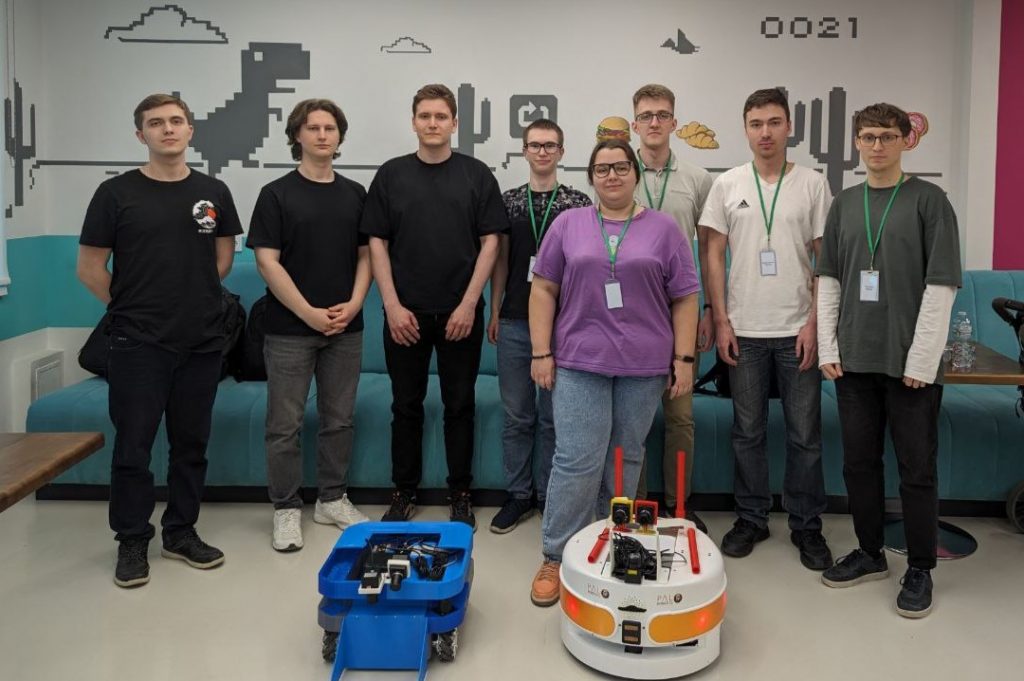KFU students among winners of regional tour of RoboCup

The team of the Laboratory of Intelligent Robotics Systems of the Institute of Information Technologies and Intelligent Systems won the regional stage of the Open Russian Robotics Championship Robot World Cup Initiative (RoboCup) in the RoboCup Robot at Home nomination.
Robotics competitions were held in two disciplines: RoboCup Junior (for students aged 12-18) and RoboCup Robot at Home, in which there was no age limit. This year, the participants of the RoboCup Robot at Home section had to use robots to clean the premises from garbage after the holiday, with the robot having to sort the garbage into two categories.
“The Republic of Tatarstan is one of the key regions of the country in educational robotics, so, of course, the Russian national committee of RoboCup was very interested in developing this international initiative here,” said Evgeny Shandarov, deputy chairman of the organizing committee of RoboCup in Russia.
This year he visited Kazan to assess the level of the event in the province.
“Last year Kazan hosted the regional qualifying stage of RoboCup for the first time. The organizer was School 21 with the support of one of the oldest universities in Russia – Kazan University. This year I was able to personally visit this event, and I want to note the high level of organization and preparation of the participants. I would like to emphasize that the RoboCup program in Kazan includes competitions in the adult league, where participants create robots – domestic helpers. This is an extremely promising area both in terms of science and industry. Tatarstan is the only place in Russia where events in this league are held, which creates prerequisites for the participation of teams from other regions and countries. I am sure that RoboCup in Tatarstan has a great future,” Shandarov shared.
RoboCup is one of the most authoritative robotics championships in the world.
“This is the second year we hold the competition, it is held at School 21. In the Republic of Tatarstan there are several strong school teams in the field of robotics, and gradually the number of participants is increasing,” said Alexander Chetvergov, the chief judge of the regional stage of RoboCup in Tatarstan. “Thanks to the active participation of KFU, we manage to cover not only schoolchildren, but also robotics students. Participation of adult teams in such competitions is very useful for children, as they see the prospects for their further professional development and the opportunity to continue improving their knowledge in one of the best universities in the country.”
Evgeny Magid, Chair of the Department of Intelligent Robotics, took part in the event as a representative of the Russian national RoboCup committee.
“This year the task of the teams participating in the RoboCup Robot at Home section was significantly more difficult than in the past. We had to integrate computer vision technologies and neural network solutions into the control system, while using a multimodal approach to map and localize the robot in the room,” explained Magid.
KFU was represented by two teams from the Laboratory of Intelligent Robotic Systems – Ninja Turtles and La Sarsa De Robo. The first team, consisting of Artyom Apurin, Bulat Abbyasov, Timur Gamberov and Niyaz Imamov, used their own ArtBul-2 robot assembled from scratch, which was developed under the Priority 2030 program. The second team consisted of Aidar Zagirov, Alexandra Dobrokvashina, Alexander Eryomin and Ruslan Fakhretdinov. The team used an off-the-shelf Spanish robot created by PAL Robotics, to which the students wrote their own software.
At the end of the final trash sorting attempt, the La Sarsa De Robo team won, scoring 7 points out of 10.
“The RoboCup competition is a great opportunity not only to hone your skills at solving a real-world problem, but also to learn something new,” said Aidar Zagirov, captain of the winning team. “The most difficult for us was creating and fixing the bucket for collecting objects, as well as recognizing objects – bottles and caps, and implementing the logic of approaching the object to capture it. We met these challenges, but it’s still worth admitting that we didn’t do that fully. However, we still won.”

